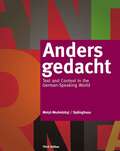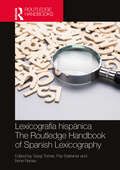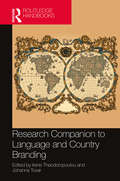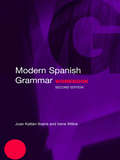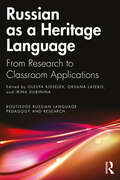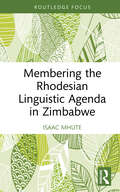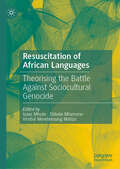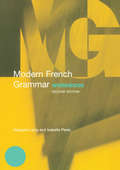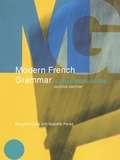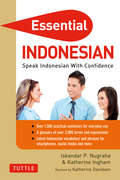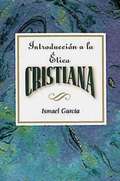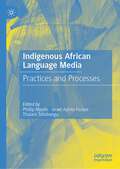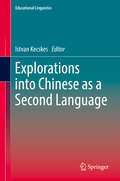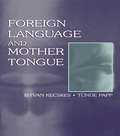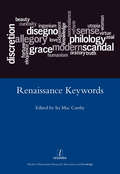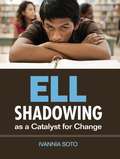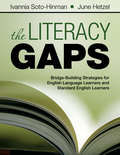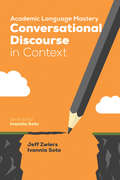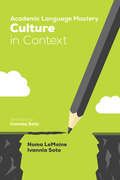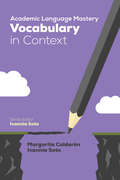- Table View
- List View
Anders Gedacht: Text And Context In The German-speaking World (World Languages Ser.)
by Irene Motyl-Mudretzkyj Michaela SpäinghausDieses vollständig auf Deutsch verfasste inhaltsbasierte Programm bereitet Deutschschüler auf mittlerem Niveau darauf vor, in zwischenmenschlichen, interpretativen und präsentativen Formen sinnvoll zu kommunizieren. Mit einem anregenden, vergleichenden Fokus auf Themen wie zeitgenössische Politik, Umwelt, Geschichte, Film, Musik, bildende Kunst, Literatur und Technologie fördert ANDERS GEDACHT, Dritte Ausgabe den kreativen Selbstausdruck sowie das kritische Denken über die deutsche Sprache und Gegenwartskulturen im deutschsprachigen Raum. Der Text bindet die Schüler durch induktive Grammatikanweisung und -wiederholung in den Lernprozess ein; kulturelle Interpretation; Analyse und Vergleich mit der eigenen Kultur; und interaktives, aufgabenbasiertes Üben.
Lexicografía hispánica / The Routledge Handbook of Spanish Lexicography (Routledge Spanish Language Handbooks)
by Sergi Torner Paz Battaner Irene RenauLexicografía hispánica/The Routledge Handbook of Spanish Lexicography presenta una panorámica integrada de la lexicografía del español. Supone un informe del estado actual y una prospectiva de futuro de la lexicografía de esta lengua bajo las posibilidades que hoy ofrece su tratamiento informático. Principales características: Capítulos dedicados a los aspectos semánticos, sintácticos, morfológicos, fonéticos, pragmáticos y ortográficos que recogen y permiten los diccionarios Análisis de rasgos ideológicos y antropológicos y atención a las consultas de los usuarios en busca de información Revisión sobre las tecnologías y los métodos actuales para la elaboración de diccionarios Estado de la cuestión sobre la investigación lexicográfica en la actualidad Análisis detallado de diccionarios generales, especializados y bilingües Lexicografía hispánica/The Routledge Handbook of Spanish Lexicography es una obra pensada para tener una visión global de la realidad, de las posibilidades y de las necesidades actuales en un sector vital de la lingüística aplicada y el procesamiento del español. Se trata de un recurso fundamental tanto para profesores como para estudiantes de lexicografía del español y de lingüística. Lexicografía hispánica / The Routledge Handbook of Spanish Lexicography offers an integrated perspective on the lexicography of Spanish. It presents a report on the current state and insight on the future of the lexicography of Spanish relying on the possibilities that computer processing provides. Main features: Chapters that cover the semantic, syntactic, morphological, phonetic, pragmatic and orthographic aspects that are considered in dictionaries. Analyses of ideological and anthropological traits and a focus on the queries of users when searching for information. A revision of the current technology and methods for creating dictionaries. Current state of the art research on lexicography. A detailed analysis of general, specialized and bilingual dictionaries. Lexicografía hispánica / The Routledge Handbook of Spanish Lexicography proposes a global overview of the reality, the possibilities and the needs of today in an essential branch of applied linguistics and the treatment of Spanish. This is an essential resource for instructors and students of Spanish lexicography and of linguistics.
Research Companion to Language and Country Branding (Routledge Studies in Language and Identity)
by Irene Theodoropoulou Johanna TovarResearch Companion to Language and Country Branding brings together entirely new interdisciplinary research conducted by scholars working on various sociolinguistic, semiotic, anthropological and discursive analytical aspects of country branding all over the world. Branding is a process of identity construction, whereby countries gain visibility and put themselves on the world map as distinctive entities by drawing on their history, culture, economy, society, geography, and their people. Through branding, countries aim not only at establishing their uniqueness but also, and perhaps most importantly, at attracting tourism, investments, high quality human capital, as well as at forging financial, military, political and social alliances. Against this backdrop, this volume explores how countries and regions imagine and portray others and themselves in terms of gender, ethnicity, and diversity today as well as the past. In this respect, the book examines how branding differs from other, related policies and practices, such as nation building, banal nationalism, and populism. This volume is an essential reference for students, researchers, and practitioners with an interest in country, nation, and place branding processes.
Modern Spanish Grammar Workbook (Modern Grammar Workbooks)
by Juan Kattan-Ibarra Irene WilkieModern Spanish Grammar Workbook is an innovative book of exercises and language tasks for all learners of European or Latin American Spanish.The book is divided into two sections:* Section 1 provides exercises based on essential grammatical structures* Section 2 practises everyday functions such as making introductions and expressing needsA comprehensive answer key at the back of the book enables you to check on your progress.Modern Spanish Grammar Workbook is ideal for all learners of European or Latin American Spanish including undergraduates taking Spanish as a major or minor part of their studies, as well as intermediate and advanced students in schools and adult education. It can be used independently or alongside Modern Spanish Grammar, also published by Routledge.
Russian as a Heritage Language: From Research to Classroom Applications (Routledge Russian Language Pedagogy and Research)
by Svetlana V. Nuss Olesya Kisselev Oksana Laleko Irina DubininaRussian as a Heritage Language: From Research to Classroom Applications brings together linguistically and pedagogically oriented research traditions in a comprehensive review of current Russian heritage language (HL) studies.Divided into three parts, the collection offers a variety of frameworks and approaches spanning research on HL speakers’ linguistic and pragmatic competence, literacy development, and sociocultural characteristics of Russian in diaspora. Presenting a wide range of new empirical findings, the volume explores topics at the forefront of HL studies, from assessment of HL learners’ linguistic competence and language attitudes to research on communities and institutional affordances impacting HL acquisition and maintenance. Each chapter connects current research with specific classroom applications, presenting Russian as a global language in various sociopolitical and majority-language contexts.Combining methodological rigor with theoretical insights across diverse areas of language study, Russian as a Heritage Language advances the field of HL pedagogy and serves as essential reading for HL educators and researchers as well as for linguists studying bilingualism.
Vocabulary of Soviet Society and Culture: A Selected Guide to Russian Words, Idioms, and Expressions of the Post-Stalin Era, 1953–1991
by Irina H. CortenIrina H. Corten's Vocabulary of Soviet Society and Culture is an experiment in what Soviet scholars call lingvostranovedenie--the study of a country and its culture through the peculiarities of its language. Not a conventional dictionary, Corten's lexicon is selective, offering a broad sampling of culturally significant words in the areas of politics, ideology, the economy, education, arts and letters, social problems and everyday life as well as language associated with the personalities and activities of individual Soviet leaders. The entries are listed alphabetically in English transliteration followed by the Cyrillic, although readers familiar with Russian may prefer to use the Cyrillic alphabet listing included in this volume. In each entry, the author provides a succinct but full explanation of the term and, whenever possible, cross-references to other entries, authentic examples of its use, and samples of relevant Soviet jokes. A reader may approach the lexicon either sequentially or with the aid of a subject thesaurus that divides the material into specific topics. A listing of complementary sources of reference appears in a useful bibliography. With this fascinating lexicon of "Sovietisms," Corten provides an invaluable and easily accessible medium for those general readers and scholars of the Russian language and Soviet culture interested in understanding contemporary Soviet life.Selected entries from the Vocabulary of Soviet Society and CultureAnekdótchik (anekdótchitsa) (cyrillic spelling) (n.)1: A person who tells jokes (anekdoty); 2: coll. since the late Stalin era, a person arrested and given a prison sentence for the telling of political jokes. The phenomenon indicates the important role of the political joke in Soviet culture and, specifically, in the dissident movement. See iazychnik; sident.The following jokes were popular during the Brezhnev era:1. "Comrade Brezhnev, what is your hobby?" "Collecting jokes about myself." "And how many have you collected so far?" "Two and a half labor camps."2. Question: What is a marked-down joke? Answer: A joke which, under Stalin, got you ten years in a labor camp, and now gets you only five.egoístiki (cyrillic) (n.; pl.). Lit., little egotists; coll. since the 1970s referring to headsets worn by music lovers, especially teenage fans of rock music. The idea is that, by wearing headsets, one shuts out the world and becomes indifferent to everything except oneself.zhrál'nia (cyrillic) (n.). Der. zhrat', to gorge, devour (vulg.); coll. since the 1970s denoting an eating establishment with inexpensive and often bad-tasting food. In the late 1980s, the term also has been applied to new fast-food restaurants which have been built in Soviet cities by Western concerns, for example, McDonald's. See amerikanka; stekliashka; stoiachka.
Membering the Rhodesian Linguistic Agenda in Zimbabwe
by Isaac MhuteMembering the Rhodesian Linguistic Agenda in Zimbabwe reports on a study carried out in Zimbabwe to ascertain the degree and effect of honouring the colonial linguistic agenda. The book employs an interpretivist philosophy and qualitative research approach that relies on participatory observations, interviewing purposively sampled informants and focus group discussions involving snowball sampled graduates. It was inspired by the Critical Language Policy Theory that considers language choice a critical determinant factor in how communities are administered politically, economically, socioculturally and educationally. It establishes that whereas linguistic imperialism meant to serve as the lifeblood of the Southern Rhodesian colonial machine, the former coloniser ensured coloniality in Zimbabwe by presenting the English language as a sacred media in political, economic, sociocultural and educational settings forever. The study establishes that the only way Zimbabwe and other such post-colonies could find redemption is by eradicating the sacredness of former colonisers’ languages by adding value to all their languages and the indigenous knowledge systems associated with them. It also demonstrates that the bigger the delay, the more is irretrievably lost together with custodians of the languages. This book will be informative for undergraduates, postgraduates and researchers in linguistics, communication, sociology, anthropology and history. It may also serve well as a resource to government researchers, politicians and other policymakers.
Resuscitation of African Languages: Theorising the Battle Against Sociocultural Genocide
by Isaac Mhute Zilibele Mtumane Vimbai Moreblessing MatizaThis book argues the case for indigenous African languages, which have been stripped of their importance and are now often overshadowed - both officially, through governmental language policies, and informally, through attitudes and ideologies - by former colonial languages. The authors present case studies from a range of countries in the region, arguing that languages tell us peoples’ identities, and that by dropping their own languages in favour of foreign and imperialist languages they lose their culture, history and identity as well. The book addresses many of the challenges currently associated with African languages, with the intention of influencing policy and practice in favour of their resuscitation. This book will be of interest to policy makers, academics and tertiary students in fields including Language Policy and Planning, Language Revitalisation, Heritage Language Learning, Indigenous and Endangered Languages, and Language Attitudes and Ideologies.
Modern French Grammar Workbook (Modern Grammar Workbooks)
by Isabelle Perez Margaret LangModern French Grammar Workbook, second edition, is an innovative book of exercises and language tasks for all learners of French. The book is divided into two sections:* section 1 provides exercises based on essential grammatical structures* section 2 practises everyday functions (e.g. making introductions, apologizing, expressing needs).A comprehensive answer key at the back of the book enables you to check your progress. Taking into account feedback from the first edition, this second edition now features:* exercises graded on a 3-point scale according to their level of difficulty* cross-referencing to the Modern French Grammar, Second Edition, for each and every exercise* topical exercises that develop vocabulary.Modern French Grammar Workbook is ideal for all learners of French: beginners, intermediate and advanced students. It can be used both independently and alongside the Modern French Grammar (ISBN 0-415-33162-5).
Modern French Grammar: A Practical Guide (Modern Grammars)
by Isabelle Perez Margaret LangThis new edition of the Modern French Grammar is an innovative reference guide to French, combining traditional and function-based grammar in a single volume. Divided into two parts, Part A covers traditional grammatical categories such as word order, nouns, verbs and adjectives and Part B is organized around language functions and notions such as: giving and seeking information describing processes and results expressing likes, dislikes and preferences. With a strong emphasis on contemporary usage, all grammar points and functions are richly illustrated with examples. Implementing feedback from users of the first edition of the Grammar, this second edition includes clearer explanations and greater emphasis on areas of particular difficulty for learners of French. This is the ideal reference grammar for learners of French at all levels, from beginner to advanced. No prior knowledge of grammatical terminology is assumed and a glossary of grammatical terms is provided. This Grammar is complemented by the Modern French Grammar Workbook Second Edition which features related exercises and activities.
Essential Indonesian
by Katherine Davidsen Iskandar Nugraha Katherine InghamA concise Indonesian phrase book and guide to Indonesian language, Essential Indonesian contains basic Indonesian vocabulary and grammar necessary for communicating in Indonesian.Part of Tuttle Publishing's Essential Phrasebooks Series, Essential Indonesian is a great first introduction and phrasebook for the language of Indonesia. Perfect for business people or tourist traveling to Indonesia or for students who want to supplement their learning (and get an A in Indonesian!), this book's easy indexing feature allows it to act as an Indonesian phrasebook or as an Indonesian to English Dictionary / English to Indonesian Dictionary. A clever "point to" feature allows you to simply point to a phrase translated in Indonesian without the need to say a single word. You will soon find yourself turning to Essential Indonesian again and again when visiting Indonesia and working or interacting with IndonesiansIn this book you will find:Over 1500 practical sentences for everyday useA glossary of over 200 terms and expressionsTerms and phrases covering essential aspects of traveling and living in IndonesiaLatest Indonesian vocabulary and phrases for smartphones, social media and more
Essential Indonesian
by Katherine Davidsen Iskandar Nugraha Katherine InghamA concise Indonesian phrase book and guide to Indonesian language, Essential Indonesian contains basic Indonesian vocabulary and grammar necessary for communicating in Indonesian.Part of Tuttle Publishing's Essential Phrasebooks Series, Essential Indonesian is a great first introduction and phrasebook for the language of Indonesia. Perfect for business people or tourist traveling to Indonesia or for students who want to supplement their learning (and get an A in Indonesian!), this book's easy indexing feature allows it to act as an Indonesian phrasebook or as an Indonesian to English Dictionary / English to Indonesian Dictionary. A clever "point to" feature allows you to simply point to a phrase translated in Indonesian without the need to say a single word. You will soon find yourself turning to Essential Indonesian again and again when visiting Indonesia and working or interacting with IndonesiansIn this book you will find:Over 1500 practical sentences for everyday useA glossary of over 200 terms and expressionsTerms and phrases covering essential aspects of traveling and living in IndonesiaLatest Indonesian vocabulary and phrases for smartphones, social media and more
Introducción a la ética cristiana AETH: Introduction to Christian Ethics Spanish
by Ismael GarciaEl estudio de la ética no solamente nos lleva a entender mejor las complejas situaciones que hoy día enfrentamos, también nos ayuda a discernir lo que subyace tras nuestras decisiones. La ética nos ayuda a descubrir, aclarar, afirmar, cambiar, reformar o trasformar valores y fines que motiva nuestra conducta.Este libro nos proveerá con las herramientas teóricas necesarias para conocer, describir y analizar los retos ético/morales que hoy día enfrentamos los cristianos.
Indigenous African Language Media: Practices and Processes
by Phillip Mpofu Thulani Tshabangu Israel Ayinla FadipeThe book contributes to the sparse academic literature on African and minority language media research. It serves as a compendium of experiences, activities and case studies on the use of native language media. Chapters in this book make theoretical, methodical and empirical contributions about indigenous African language media that are affected by structural factors of politics, technology, culture and economy and how they are creatively produced and appropriated by their audiences across African cultures and contexts. This book explores indigenous African language media about media representations, media texts and contents, practice-based activities, audience reception and participation, television, popular culture and cinema, peace and conflict resolution, health and environmental crisis communication, citizen journalism, ethnic and identity formation, beat analysis and investigative journalism, and corporate communication. There are hardly any similar works that focus on the various issues relating to this body of knowledge. The book provides a valuable companion for scholars in various fields like communication, media studies, African studies, African languages, popular culture, journalism, health and environmental communication.
Explorations into Chinese as a Second Language
by Istvan KecskesThis volume explores how linguistic research can support the teaching and learning of Chinese as a second language. It responds to a rapidly growing interest in the Chinese language all over the world, and answers the need for a strong research background for the discipline. Without that, Chinese language learning remains only a unique experience and/or a useful education challenge. The first section explores crucial issues about the structure and use of Chinese as a Second Language such as word-order, noun-noun compounds, meaning-making in writing, pronunciation and stress and tone. The second section explores the learning of Chinese by seeking answer to questions about difficulties, expectations, beliefs, use of corpus and learning how to express necessity. The authors coming from eight different countries demonstrate how existing knowledge has been generated, bring together different lines of research, point out tendencies in the field, demonstrate and explain what tools and methods researchers can use to address major issues in the field, and give direction to what future research should focus on.
Foreign Language and Mother Tongue
by Istvan Kecskes Tnde PappThis is the first book that discusses the effect of foreign language learning on first language processing. The authors argue that multilingual development is a dynamic and cumulative process characterized by transfer of different nature, and results in a common underlying conceptual base with two or more language channels that constantly interact with each other. Language representation and processing are discussed from a cognitive-pragmatic rather than a lexical-syntactic perspective. This required the review of several crucial issues of L2 acquisition, such as transfer, vocabulary development, conceptual fluency, and pragmatic skills. The authors also reviewed a large body of literature touching on cognitive psychology, linguistics, psycholinguistics, SLA, philosophy, and education in order to explain multilingual development and the positive effect of foreign language learning on the first language. An important read for linguists and language educators alike, this volume: * attempts to explain multilingual development from a cognitive-pragmatic perspective, * argues that foreign language learning has a positive effect on the development and use of mother tongue skills, * relies on research findings of several different disciplines, * builds on the results of quantitative research conducted by the authors, and touches on a wide range of literature.
Renaissance Keywords
by ItaMac CarthyCertain words played a crucial role in the making of the European Renaissance, and still recur today in our shifting understanding of it. Discretion and grace, to take two examples studied here, express how individuals thought about themselves, each other and their experience of the world, yet they are as hard to define as they are ever-present in Renaissance discourse. In this collection of essays, scholars from across the Humanities offer new interpretations of these and other 'keywords', to adopt Raymond Williams's term, and investigate the vocabulary that not only accompanied, but also produced, the cultural transformations that made the Renaissance so distinctive. A keywords approach to Renaissance Europe provides a rich contextual framework for the exploration of its central ideas. It also highlights the need for fresh thinking on current histories of the age. Seven Renaissance Keywords engages with the ongoing debate about the term 'Renaissance' itself, perhaps more our keyword than theirs, and seeks alternative ways to understand a culture and society which produced conceptions of the self as much as it did art and science. The result is an exploration at the cutting edge of contemporary research. Ita Mac Carthy is Lecturer in Italian Studies at the University of Birmingham.
ELL Shadowing as a Catalyst for Change
by Ivannia M. SotoExperience a day in the life of an ELL What if you could barely understand what your teacher was saying? ELL shadowing helps teachers experience the classroom from the student’s point of view. The author describes how to implement this easily accessible form of professional development, outlines specific strategies for adapting instruction to engage ELLs, and provides supporting videos on a companion website. Benefits include: Increased teacher sensitivity to ELLs’ school experiences A heightened sense of urgency to help ELLs learn academic language and content Improved classroom instruction that spreads throughout schools and districts More engaged students who are more likely to stay in school and reach their potential
The Literacy Gaps: Bridge-Building Strategies for English Language Learners and Standard English Learners
by Ivannia M. Soto June HetzelBuild bridges of support so English language learners and standard English learners can learn alongside their peers! This comprehensive, research-based guide helps teachers bridge multiple gaps and promote learning for English language learners (ELLs) and standard English learners (SELs). The authors provide strategies, examples, and tools to address: <p><p> The gap between students and texts: covering word recognition, background knowledge, comprehension, and academic language development <p> The gap between students and teachers: including sociocultural differences between teachers and students and teacher perceptions and expectations <p> The gap between students and their peers: discussing language proficiency differences, grouping strategies, and grade-level and schoolwide programs
Academic Language Mastery: Conversational Discourse in Context
by Jeff Zwiers Ivannia SotoBy now it’s a given: if we’re to help our ELLs and SELs access the rigorous demands of today’s content standards, we must cultivate the "code" that drives school success: academic language. Look no further for assistance than this much-anticipated series from Ivannia Soto, in which she invites field authorities Jeff Zwiers, David and Yvonne Freeman, Margarita Calderon, and Noma LeMoine to share every teacher’s need-to-know strategies on the four essential components of academic language. The subject of this volume is conversational discourse. Here, Jeff Zwiers reveals the power of academic conversation in helping students develop language, clarify concepts, comprehend complex texts, and fortify thinking and relational skills. With this book as your roadmap, you’ll learn how to: Foster the skills and language students must develop for productive interactions Implement strategies for scaffolding paired conversations Assess student’s oral language development as you go It’s imperative that our ELLs and SELs practice academic language in rich conversations with others in school, especially when our classrooms may be their only opportunities to receive modeling, scaffolding, and feedback focused on effective discourse. This book, in concert with the other three volumes in the series, can provide both a foundation and a framework for accelerating the learning of diverse students across grade levels and disciplines.
Academic Language Mastery: Conversational Discourse in Context
by Jeff Zwiers Ivannia SotoBy now it’s a given: if we’re to help our ELLs and SELs access the rigorous demands of today’s content standards, we must cultivate the "code" that drives school success: academic language. Look no further for assistance than this much-anticipated series from Ivannia Soto, in which she invites field authorities Jeff Zwiers, David and Yvonne Freeman, Margarita Calderon, and Noma LeMoine to share every teacher’s need-to-know strategies on the four essential components of academic language. The subject of this volume is conversational discourse. Here, Jeff Zwiers reveals the power of academic conversation in helping students develop language, clarify concepts, comprehend complex texts, and fortify thinking and relational skills. With this book as your roadmap, you’ll learn how to: Foster the skills and language students must develop for productive interactions Implement strategies for scaffolding paired conversations Assess student’s oral language development as you go It’s imperative that our ELLs and SELs practice academic language in rich conversations with others in school, especially when our classrooms may be their only opportunities to receive modeling, scaffolding, and feedback focused on effective discourse. This book, in concert with the other three volumes in the series, can provide both a foundation and a framework for accelerating the learning of diverse students across grade levels and disciplines.
Academic Language Mastery: Culture In Context
by Noma R. LeMoine Ivannia SotoBy now it’s a given: if we’re to help our ELLs and SELs access the rigorous demands of today’s content standards, we must cultivate the "code" that drives school success: academic language. Look no further for assistance than this much-anticipated series from Ivannia Soto, in which she invites field authorities Jeff Zwiers, David and Yvonne Freeman, Margarita Calderon, and Noma LeMoine to share every teacher’s need-to-know strategies on the four essential components of academic language. The subject of this volume is culture. Here, Noma LeMoine makes clear once and for all how culturally and linguistically responsive pedagogy validates, facilitates, liberates, and empowers ethnically diverse students. With this volume as your roadmap, you’ll learn how to: Implement instructional strategies designed to meet the linguistic and cultural needs of ELLs and SELs Use language variation as an asset in the classroom Recognize and honor prior knowledge, home languages, and cultures The culture and language every student brings to the classroom have vast implications for how to best structure the learning environment. This guidebook will help you get started as early as tomorrow. Better yet, read all four volumes in the series as an all-in-one instructional plan for closing the achievement gap.
Academic Language Mastery: Culture In Context
by Noma R. LeMoine Ivannia SotoBy now it’s a given: if we’re to help our ELLs and SELs access the rigorous demands of today’s content standards, we must cultivate the "code" that drives school success: academic language. Look no further for assistance than this much-anticipated series from Ivannia Soto, in which she invites field authorities Jeff Zwiers, David and Yvonne Freeman, Margarita Calderon, and Noma LeMoine to share every teacher’s need-to-know strategies on the four essential components of academic language. The subject of this volume is culture. Here, Noma LeMoine makes clear once and for all how culturally and linguistically responsive pedagogy validates, facilitates, liberates, and empowers ethnically diverse students. With this volume as your roadmap, you’ll learn how to: Implement instructional strategies designed to meet the linguistic and cultural needs of ELLs and SELs Use language variation as an asset in the classroom Recognize and honor prior knowledge, home languages, and cultures The culture and language every student brings to the classroom have vast implications for how to best structure the learning environment. This guidebook will help you get started as early as tomorrow. Better yet, read all four volumes in the series as an all-in-one instructional plan for closing the achievement gap.
Academic Language Mastery: Vocabulary In Context
by Margarita Espino Calderon Ivannia SotoBy now it’s a given: if we’re to help our ELLs and SELs access the rigorous demands of today’s content standards, we must cultivate the "code" that drives school success: academic language. Look no further for assistance than this much-anticipated series from Ivannia Soto, in which she invites field authorities Jeff Zwiers, David and Yvonne Freeman, Margarita Calderon, and Noma LeMoine to share every teacher’s need-to-know strategies on the four essential components of academic language. The subject of this volume is vocabulary. Here, Margarita Calderon reveals how vocabulary is best taught as a tool for completing and constructing more complex messages. With this book as your roadmap, you’ll learn how to: Teach high-frequency academic words and discipline-specific vocabulary across content areas Utilize strategies for teaching academic vocabulary, moving students from Tier 1 to Tiers 2 and 3 words and selecting appropriate words to teach Assess vocabulary growth as you go Our vocabulary instruction must come from the texts our ELLs and SELs are about to read, not from a set of activities that teach words in isolation. This guidebook will help you get started as early as tomorrow. Better yet, read all four volumes in the series and put in place an all-in-one instructional plan for closing the achievement gap.
Academic Language Mastery: Vocabulary In Context
by Margarita Espino Calderon Ivannia SotoBy now it’s a given: if we’re to help our ELLs and SELs access the rigorous demands of today’s content standards, we must cultivate the "code" that drives school success: academic language. Look no further for assistance than this much-anticipated series from Ivannia Soto, in which she invites field authorities Jeff Zwiers, David and Yvonne Freeman, Margarita Calderon, and Noma LeMoine to share every teacher’s need-to-know strategies on the four essential components of academic language. The subject of this volume is vocabulary. Here, Margarita Calderon reveals how vocabulary is best taught as a tool for completing and constructing more complex messages. With this book as your roadmap, you’ll learn how to: Teach high-frequency academic words and discipline-specific vocabulary across content areas Utilize strategies for teaching academic vocabulary, moving students from Tier 1 to Tiers 2 and 3 words and selecting appropriate words to teach Assess vocabulary growth as you go Our vocabulary instruction must come from the texts our ELLs and SELs are about to read, not from a set of activities that teach words in isolation. This guidebook will help you get started as early as tomorrow. Better yet, read all four volumes in the series and put in place an all-in-one instructional plan for closing the achievement gap.
